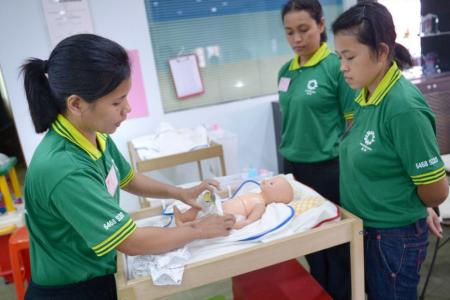Insurance boost for domestic helpers
Personal accident insurance policies for maids to be standardised, minimum coverage to go from $40,000 to $60,000
In a move to ensure greater protection for foreign domestic workers, employers will have to provide better insurance coverage for their helpers from Oct 1.
Personal accident insurance policies will be standardised across all insurers, who currently have varying definitions for accidents and exclusions.
The minimum coverage amount will also be increased to $60,000 - up from $40,000 - Minister of State for Manpower Sam Tan announced yesterday at a May Day celebration organised for domestic workers by the labour movement.
This means annual insurance premiums, which cost a little over $100 each year, are expected to go up by between $7 and $15, The Straits Times reported.
Under the new rules, the coverage provided by insurers will be standardised to ensure that all maids receive the same protection throughout their employment in Singapore.
Insurance companies now provide different coverage for personal accidents, with some spelling out a narrower definition for accidents and with more exclusions.
"The current level of protection... is no longer sufficient in the event that an accident happens and the foreign domestic worker is no longer able to provide for her family," said Mr Tan, noting that some employers have also asked if more can be done to protect the families of domestic workers who are injured in accidents.
From Oct 1, the Ministry of Manpower (MOM) will stipulate that personal accident insurance for maids must cover any sudden, unforeseen and unexpected incident that results in permanent disability or death.
The insurer also cannot impose any exclusion clauses, other than those specified by the MOM, said Mr Tan.
Another change to the rules will clarify the period of insurance cover for maids: this must be from the date she arrives in Singapore till the date she returns to her country at the end of her employment contact.
Mr Tan also said the coverage should last till the day a new work permit is issued in the event a maid changes employers - ensuring seamless transition.
SPEED UP
To speed up the compensation process, maids and their legal representatives will be able to file claims with insurers, instead of relying on their employers to do so on their behalf.
The Government last reviewed personal accident protection for maids in 2008.
Mr Tan noted the Centre for Domestic Employees has been asking the Government to perform another review, citing the fact that the cost of living in their home countries have since increased.
Mrs Winnie Wang of maid agency Advance Link International welcomed the standardised coverage and raised minimum coverage.
"Most employers don't think much of insurance and usually want the cheapest option.
"But insurance is very important. It helps with the bills if something were to happen to their maid," she told The New Paper.
Mr Anthony Hoon, chairman of Anda Insurance, the managing agent of AXA insurance, did not see any issues for insurers over the new rules.
"We will have no problem adjusting," he said.
"More importantly, it gives the maids, many of whom are poor women coming here to make a living, a fairer compensation if something unforeseen were to happen to them here."
Employers TNP spoke to also said they had no gripe with the increase in premiums.
Ms Chelsia Wang, 34, a research fellow, has had a domestic helper since last November.
She said: "The price increase would be negligible anyway, compared to the rest of fees, such as the air ticket and agency admin fees, which are in the hundreds."
Housewife Helen Koh, 58, also does not mind paying more.
"My maid has been with my family for over 20 years. In fact, I bought another two separate policies for her.
"It gives us a peace of mind knowing she is covered," she said.
There are more than 230,000 foreign maids working here.
In 1997, the Government made it compulsory for employers to buy personal accident insurance coverage of at least $10,000 for their foreign maids. This was raised to $40,000 in 2008.
FOR MORE, READ THE STRAITS TIMES TODAY
Get The New Paper on your phone with the free TNP app. Download from the Apple App Store or Google Play Store now



